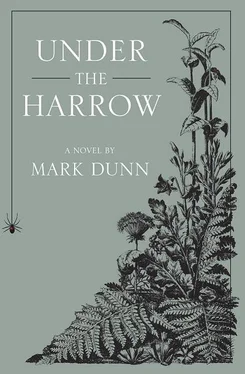Chapter the Seventeenth. Tuesday, June 24, 2003
 y only marginally informative visit to Regents Park Stables had diverted me for a short time from indulging in worry and concern over what my brother Gus had said to me in his despairing hour. But now Gus and the frightful earnestness that characterised his need to launch himself from Dingley Dell in search of his son weighed heavily and importunately upon my thoughts. I rose next morning determined to engage my brother at his place of employment, where he kept watch over how many fishes came into the dried fish warehouse and how many fishes went out. I wished to make certain that Gus had taken this latest perilous scheme of his and tossed it decisively into the dustbin of impractical stratagems — a dustbin, I might add, overfilled with like deposits from a most injudicious mind.
y only marginally informative visit to Regents Park Stables had diverted me for a short time from indulging in worry and concern over what my brother Gus had said to me in his despairing hour. But now Gus and the frightful earnestness that characterised his need to launch himself from Dingley Dell in search of his son weighed heavily and importunately upon my thoughts. I rose next morning determined to engage my brother at his place of employment, where he kept watch over how many fishes came into the dried fish warehouse and how many fishes went out. I wished to make certain that Gus had taken this latest perilous scheme of his and tossed it decisively into the dustbin of impractical stratagems — a dustbin, I might add, overfilled with like deposits from a most injudicious mind.
Gus’s superintendent Mr. Mell reported to me upon my arrival that he had just received word by ticket porter that my brother had decided to accompany his wife Charlotte on her restorative visit to her friend Miss Snigsworth and would therefore be stopping in Hungerford for the next several days. Gus’s present whereabouts were confirmed by the letter I found addressed to me, secured beneath the iron knocker upon the front door to Gus and Charlotte’s cottage in Fingerpost. Appended in postscript was a request, attributed to Charlotte, that I be so kind as to water the roses and geraniums and scarlet beans, and a notation as to where in the outhouse I would find the watering-pot (for Alice could not be trusted to interrupt her Pupkerian holiday to do it, nor would they choose to enlist the widow Chillip who lived next door and once mortally drowned Charlotte’s American aloe in a full tub of water as if it were watercress). The prosy nature of the missive gave me hope that my brother and sister-in-law were attempting as best they could to return themselves to some semblance of normal life, clouded to be sure by the loss of their son, but needful of disallowing grief to reign despotically over the remainder of their years together.
I returned to my lodgings and made every effort to turn my concerted attention to those articles I’d promised the Dingley Delver that were behindhand. But my mind was not wholly suited to the task and I soon found myself upon a long and musing ramble about the Dell, sorting my thoughts, revisiting conversations with my brother and with Muntle who ached even to this day for the companionship of his own brother. My steps took me by and by to the Wang-Wang Rice Farm teahouse, which had become my favourite place of private contemplative refuge. As I approached the structure, which had been modeled in the shape of a pagoda, I could not help thinking of my nephew and how late I had sat up with him on cherished Saturday nights playing dominos and backgammon and his own version of miniature battledore using kitchen spatulas, and how at other times we had corresponded like bearded, angle-limbed Egyptians using the ancient language of hieroglyphics, or had stuffed our gullets with apricots from the Scadger clan’s fruit grove and then hid sticky and snickering behind a hedge when the men of that rustic family returned from their weekly hunt with freshly-slain venison for the spit, oblivious to our mischief.
As a very young boy Newman had once built a pagoda of nursery blocks. It was rather good, as I recall.
Upon entering that oriental outpost, I was unprepared for the intriguing sight that greeted me. There, huddled in a dark corner of that jessamine-scented tearoom, were the librarian Uriah Graham and the Vicar Upwitch. The room’s only two occupants (excepting myself) were poring over something spread out upon their table, Upwitch’s hand rhythmically patting the head of his companion with noticeable affection.
Seeing me across the room, the pastor exclaimed, “Saint George and the Dragon!” and quickly withdrew his hand as if from coals upon a hot stove. “As I live and breathe — it’s Frederick Trimmers come all the way to Nanking!”
I put out my hand, which was heartily wrung by each of the two men as Upwitch signalled that I should draw up a chair and sit myself down for a visit.
“My dear Mr. Trimmers,” said Graham in his soft and genial manner, “for what possible reason have you come such a distance to grace us with your presence to-day?”
“My visit here isn’t exceptional, Graham,” I answered good-naturedly. “I come to this oriental hideaway now and again for the peace and quiet it affords me.” I cleared my throat. “As apparently so do two other men with whom I’m acquainted.”
The two men in question exchanged a pregnant glance before Upwitch turned his gaze to me in reply: “Dingley Dell, as you know, Trimmers, offers few quiet corners, with everyone always out and about and into everyone else’s business. Consequently, Graham and I tend to seek out those few retiring spots for the, um, solitude. By the bye, look at the map that my multi-talented friend has nearly completed, which we have been inspecting at our undisturbed leisure. It gives the entire valley with every road and tree and nearly every stone put down.”
Graham coloured and adjusted his horn spectacles (though they were sitting quite comfortably as they were) and offered the simple retort, “My friend exaggerates.”
Graham had not the thick blond mane and chiseled statuary good looks of his friend Upwitch, who was known to elicit a swoon or two from the female members of his congregation when sweltering circumstances required a loosening of the surplice and sometimes its removal from the body altogether. Graham was of a softer, more feminine variety of man, perfectly suited to his studious profession of librarian and academic author, but nonetheless sun-browned and solid-limbed from his love of exploratory perambulations to every green nook and stony cranny of the Dell, equipped with sturdy boots and a dependable walnut hiking stick.
I turned the map to view it in its proper orientation and was quite taken with the work that Graham had done. “Masterful is the only word for it,” said I.
The librarian accepted the compliment with a proud grin. “I do not fancy any of the standard maps, you see. Do you know, for example, that none of the current maps give Belgrave Dam in its proper scale? Slipshod work, sir, and inexcusable.”
“Our former mapmakers seemed to have cared little about the southernmost portion of our valley,” I elaborated. “Perhaps because the unsightly mine is there, and Blackheath, the unsightly collier’s town, and the iron pit.”
“Equally unsightly,” said Upwitch.
I nodded. “It is none of it pretty, but certainly undeserving of cartographic neglect.”
“Hear, hear!” said Upwitch. The table grew silent. Upwitch composed himself. “We continue to pray for your nephew, Trimmers.” Lacing the fingers of both of his hands together in a prayerful attitude upon the tabletop, the vicar continued: “Such a tragedy it is to lose a loved one to the Terra Incognita. There is a high fence circumscribing this valley but still it does not stop a person who is determined to leave us.”
“There are also breaches in the fence that help one to that end,” added Graham.“I had thought to mark them upon my map, but then reconsidered, not wishing to tempt other boys to do the same as your nephew has done.”
Graham took a sip of tea just as the proprietor of the teahouse, Mrs. Wang-Wang herself, came to ask if I would have my customary cup of apple-tea.
“Yes, of course, Mrs. Wang-Wang, but bring biscuits as well. These gentlemen seem to be in a self-denying mood to-day and I’ll not have it. Tea, in my opinion, is best imbibed with a sweet viand, wouldn’t you say?”
Читать дальше

 y only marginally informative visit to Regents Park Stables had diverted me for a short time from indulging in worry and concern over what my brother Gus had said to me in his despairing hour. But now Gus and the frightful earnestness that characterised his need to launch himself from Dingley Dell in search of his son weighed heavily and importunately upon my thoughts. I rose next morning determined to engage my brother at his place of employment, where he kept watch over how many fishes came into the dried fish warehouse and how many fishes went out. I wished to make certain that Gus had taken this latest perilous scheme of his and tossed it decisively into the dustbin of impractical stratagems — a dustbin, I might add, overfilled with like deposits from a most injudicious mind.
y only marginally informative visit to Regents Park Stables had diverted me for a short time from indulging in worry and concern over what my brother Gus had said to me in his despairing hour. But now Gus and the frightful earnestness that characterised his need to launch himself from Dingley Dell in search of his son weighed heavily and importunately upon my thoughts. I rose next morning determined to engage my brother at his place of employment, where he kept watch over how many fishes came into the dried fish warehouse and how many fishes went out. I wished to make certain that Gus had taken this latest perilous scheme of his and tossed it decisively into the dustbin of impractical stratagems — a dustbin, I might add, overfilled with like deposits from a most injudicious mind.










